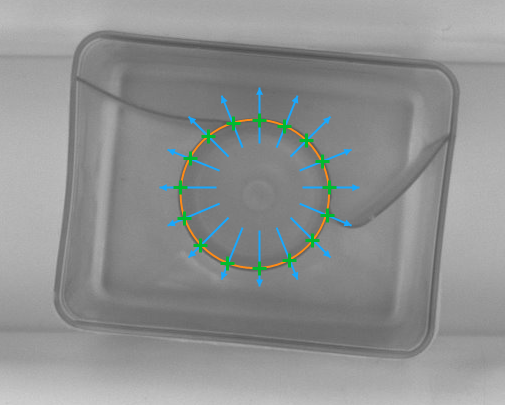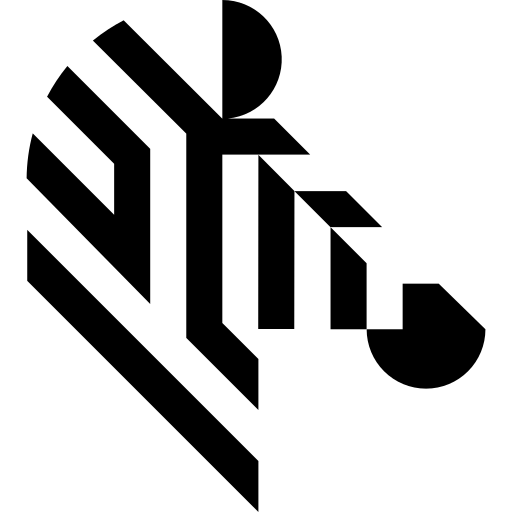You are here: Start » Function Reference » Computer Vision » Shape Fitting » FitCircleToRidges_Direct
FitCircleToRidges_Direct
| Header: | AVL.h |
|---|---|
| Namespace: | avl |
| Module: | MetrologyPro |
Performs a series of 1D ridge detections and finds a circle that best matches the detected points.
Applications: Precise detection of a thin circular line, whose rough location is known beforehand.
Syntax
void avl::FitCircleToRidges_Direct ( const avl::Image& inImage, const avl::CircleFittingField& inFittingField, atl::Optional<const avl::CoordinateSystem2D&> inFittingFieldAlignment, int inScanCount, int inScanWidth, const avl::SamplingParams& inSamplingParams, const avl::RidgeScanParams& inRidgeScanParams, avl::Selection::Type inRidgeSelection, atl::Optional<const avl::LocalBlindness&> inLocalBlindness, float inMaxIncompleteness, avl::CircleFittingMethod::Type inFittingMethod, atl::Optional<avl::MEstimator::Type> inOutlierSuppression, atl::Conditional<avl::Circle2D>& outCircle, atl::Optional<atl::Array<atl::Conditional<avl::Ridge1D>>&> outRidges = atl::NIL, atl::Optional<atl::Conditional<avl::Profile>&> outDeviationProfile = atl::NIL, atl::Optional<avl::CircleFittingField&> outAlignedFittingField = atl::NIL, atl::Optional<atl::Array<avl::Point2D>&> outInliers = atl::NIL, atl::Optional<atl::Array<avl::Profile>&> outBrightnessProfiles = atl::NIL, atl::Optional<atl::Array<avl::Profile>&> outResponseProfiles = atl::NIL, atl::Array<avl::Segment2D>& diagScanSegments, atl::Array<avl::Rectangle2D>& diagSamplingAreas )
Parameters
| Name | Type | Range | Default | Description | |
|---|---|---|---|---|---|
 |
inImage | const Image& | Image to fit the circle to | ||
 |
inFittingField | const CircleFittingField& | Circle fitting field | ||
 |
inFittingFieldAlignment | Optional<const CoordinateSystem2D&> | NIL | Adjusts the fitting field to the position of the inspected object | |
 |
inScanCount | int | 3 -  |
10 | The number of points that will be searched to estimate the position of the circle |
 |
inScanWidth | int | 1 -  |
5 | The width of each scan field (in pixels) |
 |
inSamplingParams | const SamplingParams& | Parameters controlling the sampling process | ||
 |
inRidgeScanParams | const RidgeScanParams& | RidgeScanParams ( ProfileInterpolation: Quadratic4 SmoothingStdDev: 1.0f RidgeWidth: 5 RidgeMargin: 2 MinMagnitude: 5.0f RidgePolarity: Dark ) | Parameters controlling the ridge extraction process | |
 |
inRidgeSelection | Selection::Type | Selection mode of ridges | ||
 |
inLocalBlindness | Optional<const LocalBlindness&> | NIL | Defines conditions in which weaker ridges can be detected in the vicinity of stronger ridges | |
 |
inMaxIncompleteness | float | 0.0 - 0.999 | 0.1f | Maximal fraction of ridge points not found |
 |
inFittingMethod | CircleFittingMethod::Type | AlgebraicTaubin | Method used to fit a circle | |
 |
inOutlierSuppression | Optional<MEstimator::Type> | NIL | Selects a method for ignoring incorrectly detected points | |
 |
outCircle | Conditional<Circle2D>& | Fitted circle or nothing if the fitting fails | ||
 |
outRidges | Optional<Array<Conditional<Ridge1D>>&> | NIL | Found ridges | |
 |
outDeviationProfile | Optional<Conditional<Profile>&> | NIL | Profile of distances between the actual circle points and the corresponding reference circle points | |
 |
outAlignedFittingField | Optional<CircleFittingField&> | NIL | Fitting field used; in the image coordinate system | |
 |
outInliers | Optional<Array<Point2D>&> | NIL | Points matching the fitting Circle | |
 |
outBrightnessProfiles | Optional<Array<Profile>&> | NIL | Extracted image profiles | |
 |
outResponseProfiles | Optional<Array<Profile>&> | NIL | Profiles of the ridge operator response | |
 |
diagScanSegments | Array<Segment2D>& | Segments along which the scans were run | ||
 |
diagSamplingAreas | Array<Rectangle2D>& | Areas from which the input image is sampled |
Optional Outputs
The computation of following outputs can be switched off by passing value atl::NIL to these parameters: outRidges, outDeviationProfile, outAlignedFittingField, outInliers, outBrightnessProfiles, outResponseProfiles.
Read more about Optional Outputs.
Description
The operation tries to fit a given circle to ridges present in the inImage image. Internally, it performs a series of scans with the ScanSingleRidge_Direct filter along inScanCount specific scan segments which length is always equal to the inFittingField width and cannot be less than 4. The found points are then used to determine the actual position of the circle in the image. Only inMaxIncompleteness fraction of these scans may fail. If the fitting according to the given parameters is not possible, outCircle is set to Nil.
Hints
- Connect an input image to the inImage input.
- Define inRidgeScanParams.RidgePolarity to detect a particular ridge type, and only that type.
- Adjust inRidgeScanParams.RidgeWidth to the expected thickness of the ridge (in pixels).
- If no or too few ridge points are found, try decreasing inRidgeScanParams.MinMagnitude.
- If some of the scans may fail, set the inMaxIncompleteness input accordingly.
- If some of the scans may produce false results, try different values of the inOutlierSuppression input.
- Use the outRidges outputs to visualize the scanning results.
Examples

Fitting a circle to a wall of a plastic capsule
(inRidgeScanParams.Polarity = Dark, inRidgeScanParams.RidgeWidth = 3).
Remarks
Read more about Local Coordinate Systems in Machine Vision Guide: Local Coordinate Systems.
This filter is a part of the Shape Fitting toolset. To read more about this technique, one can refer to the Shape Fitting chapter of our Machine Vision Guide
Hardware Acceleration
This operation supports automatic parallelization for multicore and multiprocessor systems.
See Also
- CreateCircleFittingMap – Precomputes a data object that is required for fast circle fitting on images.
- FitCircleToEdges_Direct – Performs a series of 1D edge detections and finds a circle that best matches the detected points.
- FitCircleToStripe_Direct – Performs a series 1D stripe detections and finds a circle that best matches the detected points.
- FitCircleToRidges – Performs a series of 1D ridge detections and finds a circle that best matches the detected points.

